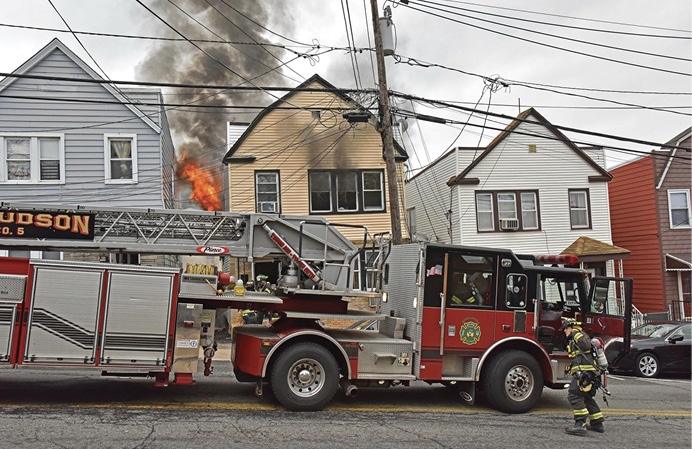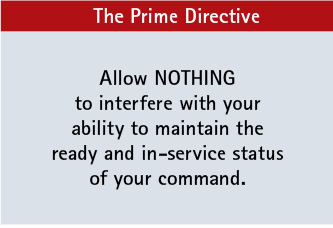
The role of an officer in the fire service is to consistently support the formal organization (the rules, regulations, and policies of the department) and to continually strive to meet the Prime Directive: Nothing shall interfere with the in-service and ready-to-respond status of your command. Meeting this directive and maintaining this mantra as your own and that of your subordinates will in turn meet your most important responsibility: protection of the community you serve. In fact, the Prime Directive is focused solely on the protection of the community, which is the only reason we exist.
Figure 1. The Prime Directive

This mantra extends to the individual, the officers, and the department. (Figure by author.)
RELATED FIREFIGHTER TRAINING
Command & Control: The Value of Scene Assignment SOPs
The Prime Directive is a departmental expectation and has its roots in the preemergency environment. Violations of the Prime Directive are very easy to recognize but are often a challenge to fix. The culture and attitude of the department affect the Prime Directive directly. If you permit violations of the Prime Directive in the soft and semisoft environment, you can be sure they will eventually come home to roost on your emergency ground (the hard environment).
In our business, you are either all in or all out; there are no “conditional ins.” Being a full-contact officer, like being a full-contact fire department, is an unconditional commitment. If you are not helping the department move forward, you are dragging it backward.
Are You Really Ready?
Let’s consider this all-too-common scenario: Your company comes on duty at 0730 hours. It is now 0755. An alarm comes in for a reported fire in your first-due district. As the company officer, you don your personal protective equipment (PPE) and get into the cab. Your personnel are moving about the gear racks getting their gear. They are not ready to respond, which causes a delay. Fires love delays. Your and your crew’s actions are endangering the community.

(1) Full-contact fire departments understand and promote the Prime Directive all day, every day. Our ability to get out the door and provide the excellent service the public expects is the foundation of our mission. (Photo by Ron Jeffers.)
This direct violation of the Prime Directive is directly your fault. Why is this going on? Because you permitted it. You know it is unacceptable. They know it is unacceptable. Still, it happens because you and the department permit it. If coffee and kitchen banter are the first activities of the day, you have to wonder what other preshift activities were neglected. Was the apparatus checked? Were the compartments opened and equipment checked? Was there an informational exchange with the off-going shift? Was the house journal read? These activities help guarantee the in-service and ready-to-respond status. They are directly tied to the Prime Directive and are your responsibility.
As the officer, it is always your fault, and you are the only one who should be fixing it. If your boss has to fix it, why does he need you? You must address and make known any violation of the Prime Directive and resolve it immediately. You must set and make known expectations and know that they have been understood. The company officer should not only see that these duties are properly taken care of but should also be a part of this process, treating it as an opportunity to make the company better. The morning meeting, which can take place right at the apparatus, can remove all vagaries and ambiguities that exist regarding the activities of the shift. After all, the company officer is ultimately responsible for the in-service and ready-to-respond status of the apparatus, the personnel, and his command. He has to get in there and get his hands dirty. Furthermore, chief officers are responsible for overseeing the Prime Directive as it pertains to the pulse of their shift. The department’s expectations and mission are the chief officers’ expectations and mission.
Full-contact supervisory, leadership, and managerial personnel understand that there is no off-duty time when on duty and that organizational virtues such as discipline, accountability, effective communications, and a solid sense of teamwork and safety come out of the firehouse just like every other tool we use to do “the job.” If you do not consistently set these pillars of an effective fireground and fire department as expectations and enforce, reinforce, and rereinforce them in the soft environment, you can never expect that they will be carried out effectively in the hard environment of the emergency ground. If the officers are not taking care of the department’s business in the firehouse, they can never take care of it on the fireground. They must understand that they own it all (photo 1).
The company officer must also understand that the department gives them full power to address and correct any violations of the Prime Directive and any further exigencies that may exist. Full-contact leaders understand that their rank does allow privilege and holds power, but departmental responsibility outweighs that privilege every time. Full-contact leaders, managers, and supervisors walk the walk and talk the talk. They deal in solutions and proactively identify issues before they become problems or emergencies, recognizing them as opportunities and allowing the resolution process to flow from a positive mindset. They understand the absolute importance of the Prime Directive and further understand that they have very little power to make fixes in the Prime Directive once they go out the door on a response. A half-empty self-contained breathing apparatus cylinder or a saw with a blade on backward is not easy to fix once on the fireground. Neither are undisciplined firefighters.
Proactive firehouse leadership looks and sounds like clear and unambiguous direction toward maintaining the Prime Directive. Power properly wielded by the supervisor/leader/manager is the engine that drives the organization to successful mission accomplishment on and off the emergency ground.
ANTHONY AVILLO, M.S., is the director and the deputy fire marshal at the Monmouth County (NJ) Fire Academy and an adjunct professor at New Jersey City University. A 35-year veteran of the fire service, he retired from North Hudson (NJ) Regional Fire & Rescue in 2015. Avillo is an FDIC International instructor and advisory board member and a member of the editorial advisory board of Fire Engineering. He is the author of Fireground Strategies, Third Ed. (Fire Engineering, 2015) and co-author of Full Contact Leadership (Fire Engineering, 2017).

